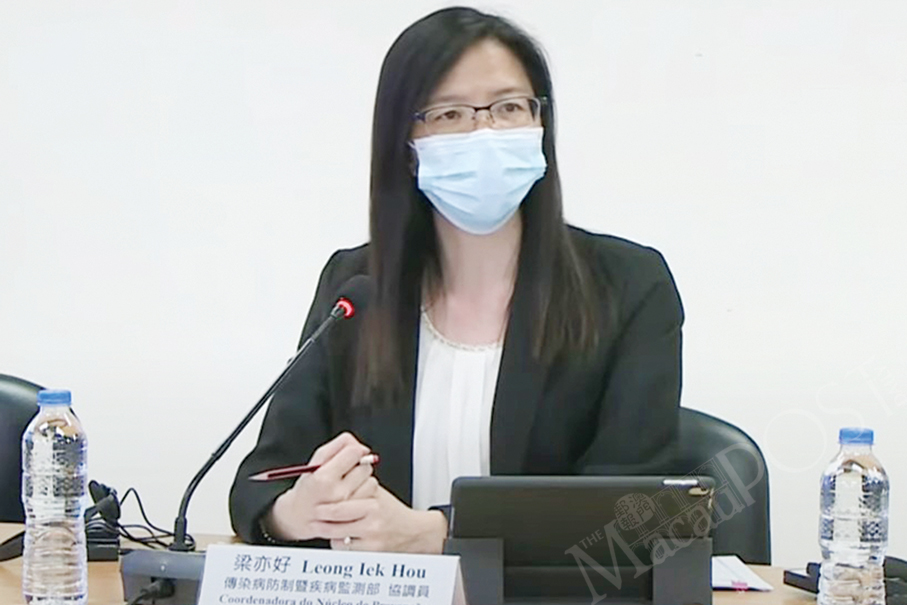2021-10-08 04:02 BY Tony Wong Comment:0
Addressing yesterday’s press conference about Macau’s novel coronavirus situation, Health Bureau (SSM) Control of Communicable Diseases and Surveillance of Diseases Department Coordinator Leong Iek Hou reaffirmed that only after Macau reaches a COVID-19 vaccination rate of 80 to 90 percent, could the local government consider shifting its zero-COVID policy to the “living with the virus” approach.
A reporter asked yesterday whether Macau could abandon its zero-tolerance COVID-19 elimination strategy and instead adopt a COVID-19 policy of “living with COVID-19”, like New Zealand which has recently decided to no longer pursue an approach that would attempt to eliminate all locally-transmitted COVID-19 cases.

Health Bureau (SSM) Control of Communicable Diseases and Surveillance of Diseases Department Coordinator Leong Iek Hou addresses yesterday’s press conference about the city’s novel coronavirus situation. Photo: GCS
In her reply, Leong noted that more countries and regions are now switching to the “living with the virus” COVID-19 approach. However, Leong was quick to add that the prerequisite is that a country or region concerned will not report a large number of novel coronavirus patients in a serious condition and COVID-19 fatalities due to the approach, because of which, Leong said, jurisdictions that have started to adopt the “living with the virus” approach normally have a high COVID-19 inoculation rate of 80 to 90 percent.
Leong underlined that only after Macau’s COVID-19 vaccination rate significantly increases could the local government consider adopting the “living with the virus” approach.
According to the website of the Health Bureau’s COVID-19 vaccination programme, as of 4 p.m. yesterday, 692,861 doses of COVID-19 vaccine had been administered to 380,303 people in Macau, comprising 65,618 who had received their first jab and 314,685 who had received their second jab.
Macau’s COVID-19 vaccination rate stood at 55.7 percent as of 4 p.m. yesterday, i.e, about 55 percent of the population had received at least one jab. According to the latest available demographics, Macau’s population stood at 682,500 at the end of June.
As the third round of a three-day mass nucleic acid testing (NAT) drive ended at 9 p.m. yesterday, the government resumes its COVID-19 vaccination drive today after a three-day suspension.
681,579 people tested – all negative
Meanwhile, the Novel Coronavirus Response and Coordination Centre announced yesterday that all results of the 681,579 people tested during the mass NAT programme, which started at 9 p.m. on Monday, were negative.
“Some countries and regions have started to adopt a COVID-19 strategy to live with the virus. Macau and many other countries and regions in the world are aiming to adopt the living with the virus approach. But the prerequisite for living with the virus is that there will not be a large number of cases resulting in [patients’] serious condition and deaths,” Leong said.
“If many cases [of patients in a] serious condition, and many fatalities among senior citizens and those with a chronic disease are reported after such a strategy is adopted, no government would accept such a situation,” Leong said.
“Only after Macau’s vaccination rate significantly increases, can we adopt the living with the virus approach while ensuring that there won’t be cases resulting in a serious condition and many fatalities,” Leong said.
“Many of the different countries and regions that have adopted the strategy to live with the virus have a very high vaccination rate of 80 to 90 percent. In particular, their vaccination rates among senior citizens and those with a chronic disease are even higher,” Leong said.
2 COVID-19 patients from Vietnam worked illegally
Meanwhile, Ma Chio Hong, who heads the Operations and Communications Division of the Public Security Police (PSP), announced during yesterday’s press conference that the police have discovered that the 75th COVID-19 patient, a Vietnamese woman, had illegally worked in Macau before she was diagnosed with the disease on Tuesday, while the 74th patient, a Vietnamese man who was confirmed as a COVID-19 patient on Monday, holds a work permit in Macau, but had illegally worked for someone who is not his officially approved employer, and had illegally engaged in work outside his officially approved job description.
The duo from Vietnam mentioned by Ma yesterday are among the recent COVID-19 renovation worker cluster of four novel coronavirus patients. The first three patents of the cluster, Macau’s 72nd, 73rd and 74th COVID-19 cases, were diagnosed with the novel coronavirus disease on Monday, while the last one was diagnosed with the disease on Tuesday.
The first two patients among the renovation worker cluster are non-resident workers employed in Macau from the mainland.
The four patients were working on a renovation project in a residential flat before they were confirmed as COVID-19 patients.
While the 73rd patient is a blue-card holder, according to Ma, the police have discovered that he had illegally worked for people other than his officially approved employer in Macau, and that he had also illegally worked in a job that is not covered by his officially approved job description.
Macau’s non-resident work permits are colloquially known as blue cards.
Ma said that the 74th patient did not hold a blue card, meaning that she had illegally worked in Macau. In addition to the two patients from Vietnam, according to Ma, the police are also investigating possible violations of Macau’s labour rules by those who had employed them for the renovation project.
Meanwhile, officials also announced at yesterday’s press conference that over 11,000 public servants, or about one-third of their total number, were involved in the three-day 3rd nucleic acid testing drive this week.
The also announced that as of yesterday, 1,352 people were in quarantine for medical observation, including 86 new admissions from mid- to high-risk areas.
1,300 unregistered Macau Pass cards suspended
Meanwhile, from 6 a.m. yesterday the MACAU Pass company suspended the use of unregistered cards whose holders had been identified by the authorities as having been on same public bus trips as COVID-19 patients from the four-member novel coronavirus cluster of renovation workers.
The Novel Coronavirus Response and Coordination Centre has noted that while the authorities have been able to contact passengers on the affected bus trips whose Macau Pass cards have been registered with their name (i.e., real-name registration), it has been difficult for the authorities to contact passengers on the affected bus trips whose Macau Pass cards have not been registered (i.e., unregistered cards).
Consequently, the centre has said, the measure to suspend the use of the affected unregistered cards aims to remind those who had been identified as having been on the affected bus trips about their situation, and urge them to contact the authorities. The centre had ordered the Macau Pass company to suspend the use of the affected cards from 6 a.m. yesterday.
During yesterday evening’s press conference, Leong said that the use of around 1,300 unregistered Macau Pass cards had been suspended due to the fact that their cardholders had been identified as having been on the affected bus trips.
Leong said that the Health Bureau would first verify whether the respective cardholders had been on the affected bus trips with the COVID-19 patients at the same time. The Health Bureau would carry out COVID-19 measures for the affected bus passengers accordingly based on their respective risks, such as nucleic acid tests, or COVID-19 medical observation quarantine for a certain period of time.
Meanwhile, officials also announced during the press conference that they are still to schedule the resumption of in-class teaching at non-tertiary schools.
According to the press conference, during this week’s testing drive some 67 percent chose throat tests, while 33 percent opted for nasal test.
 Govt rolls out its 6th-term CE electoral process
Govt rolls out its 6th-term CE electoral process
 Govt aims to reopen Red Market in June
Govt aims to reopen Red Market in June
 At least 9 dead, over 1,000 hurt in most powerful Taiwan quake in 25 years
At least 9 dead, over 1,000 hurt in most powerful Taiwan quake in 25 years